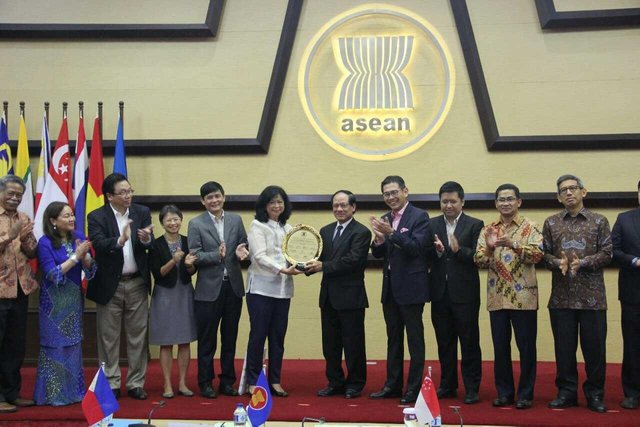Indonesia's participation in International Organizations

The Indonesian government during the New Order period was also active in several institutions
international, as follows.
- Consultative Group on Indonesia (CGI)
Before the Indonesian government received development funding from
Consultative Group on Indonesia (CGI) got funding first
development of the Inter-Governmental Group on Indonesia (IGGI).
Inter-Governmental Group on Indonesia (IGGI) was founded in 1967.
The goal is to provide long-term credit assistance with a light interest to
Indonesia for development costs. IGGI members consist of two groups.
a) The creditor countries, such as Britain, France, Belgium, Italy, Switzerland, Japan,
Netherlands, West Germany, Australia, New Zealand, the United States, and
Canada.
b) World financial bodies both internationally and regionally, such as the Bank
World Bank, Asian Development Bank,
The International Monetary Fund, and the Community
European Economy (EEC).

IGGI is based in The Hague (Netherlands). IGGI chairman is held by the Minister
Development Cooperation of the Kingdom of the Netherlands. IGGI Assistance to Indonesia,
among other things:
a) project assistance,
b) program assistance,
c) food aid,
d) technical assistance,
e) credit income (foreign exchange earned from loans), and
f) grant (donation or gift).
IGGI assistance to Indonesia is given annually. Every year
an IGGI session is held to discuss and evaluate the implementation
development of Indonesia as a basis for next year's grant.
Assistance in the form of loan (credit conditional) with soft conditional
interest ranges from 0-3% a year with the installment period ranges from 7-10
year.
Assistance from IGGI used for project development
productive and social welfare, among others as follows.
a) Technical assistance, generally not received in the form of money, but in
forms of expert assistance, laboratory equipment, and research.
b) Grant is used for the cost of various development purposes,
for example to buy a sea freight boat.
c) Credit and food aid are used for the import of goods
capital, raw materials, and foodstuffs.
d) Project assistance is used for the cost of developing an electricity project,
development of telecommunication, irrigation, education, health (program
KB), and other infrastructure.
e) Program assistance is used for programming costs
development.
On 25 March 1992, IGGI broke up because Indonesia refused to help
The Netherlands is considered too much linking its foreign loans
with political problems in Indonesia. Instead, the government
Indonesia asked the World Bank to establish the Consultative Group on
Indonesia (CGI).
CGI held its first hearing in Paris, France on July 16, 1992.
The session was attended by 18 countries and 10 internationally led institutions
by the World Bank. CGI members consist of former member countries of IGGI
(except the Netherlands) and international institutions.
CGI member countries, among others:
a) Japan, j) Austria,
b) South Korea, k) Canada,
c) United States, l) Italy,
d) French, m) Spanish,
e) Germany, n) Finland,
f) English, o) Swedish,
g) Switzerland, p) Norway, and
h) Belgium, q) New Zealand.
i) Denmark,
International agencies participating in CGI, among others:
a) World Bank, j) UNESCO,
b) ADB, k) UNHCR,
c) UNDP, l) IAEA,
d) WFP, m) Mordic Investments Bank,
e) UNFPA, n) IFAD,
f) WHO, o) IDB,
g) FAO, p) UNICEF,
h) UNIDO, q) Kuwait Fund, and
i) ILO, r) Saudi Fund.
- Asia Pasific Economic Cooperation (APEC)
APEC is a forum of economic cooperation of countries in the region
Asia and the Pacific. APEC was formed in December 1989 in Canberra,
Australia. The idea of APEC emerged from Robert Hawke, the Prime Minister of Australia